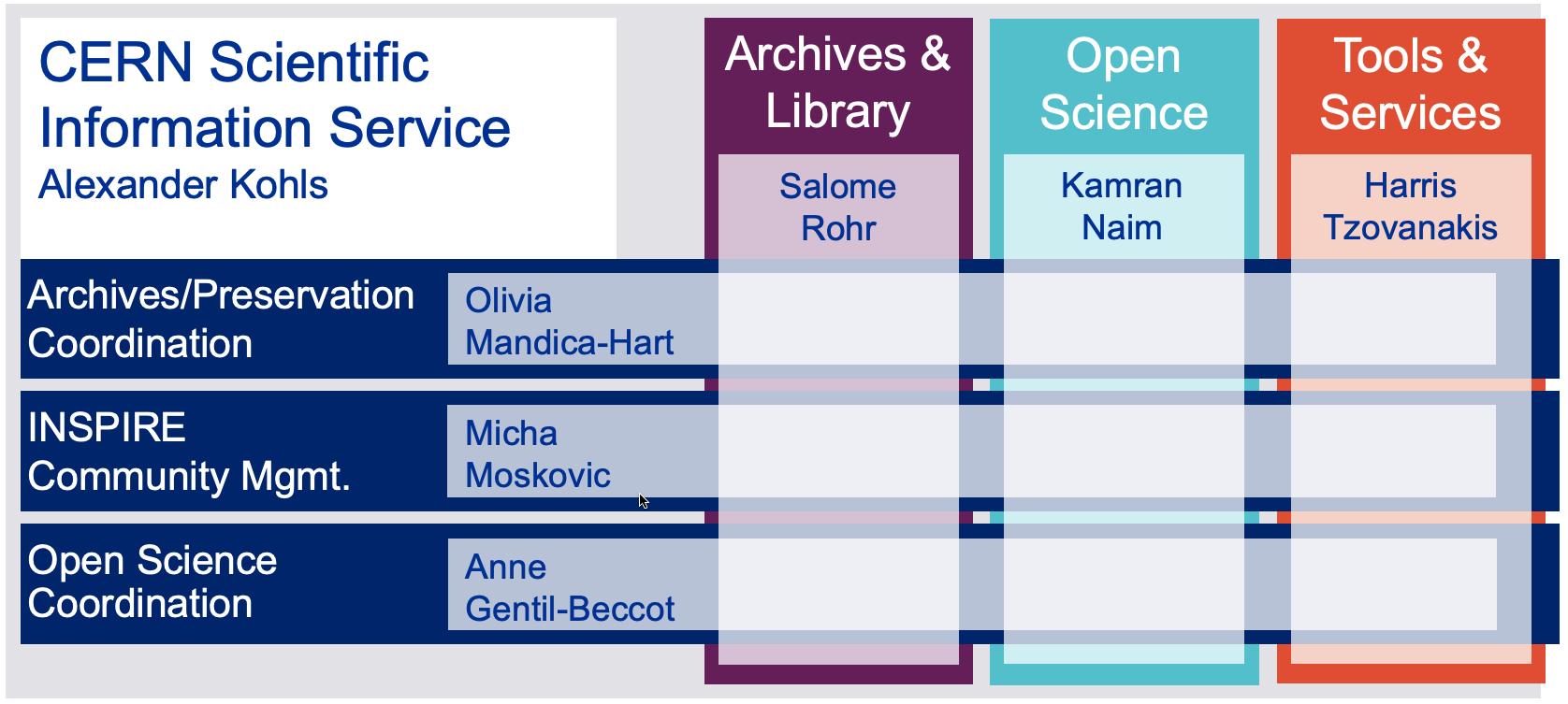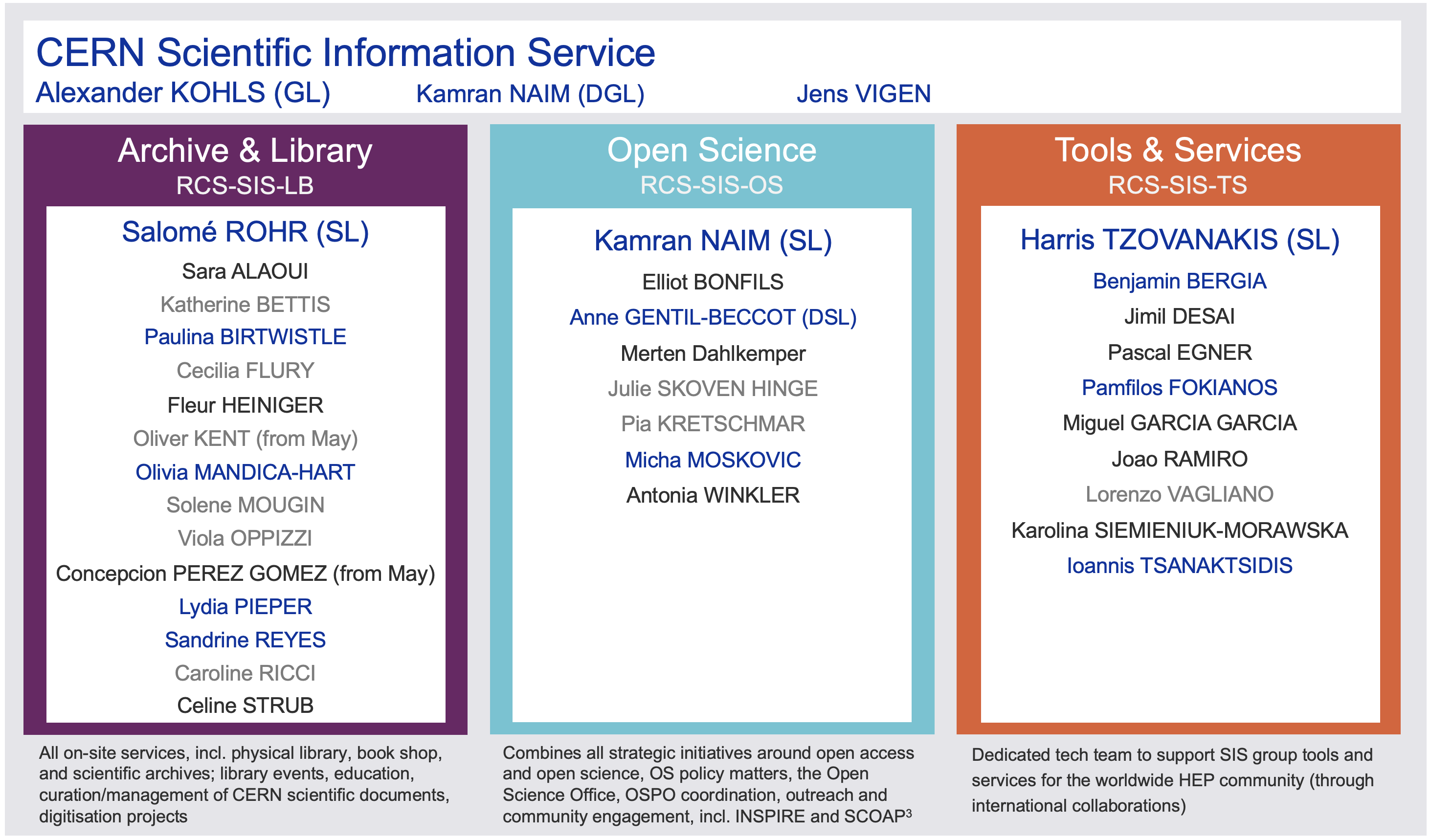Structure

SIS Organisational Structure
The Scientific Information Service applies a matrix structure for the best possible service for the CERN community. Four sections provide expertise in the three key competencies: archives/library services, open science, and supporting technology solutions. In addition, three product managers coordinate the further development and user-centric operation of SIS' key transversal services: INSPIRE, Open Science, and Open Access.
Sections
Archives & Library (RCS-SIS-LB)
The CERN Library ensures access to a wealth of relevant and up-to-date scientific information: books, conference proceedings, journals, reports, technical standards, theses among others. To meet the needs of the CERN and the high-energy physics community for a 24/7 service, a growing amount of documents are available online.
The CERN Library preserves and showcases CERN's rich and diverse scientific research output, by indexing all articles, books and reports authored by members of CERN personnel.
The CERN Library also trains library apprentices for the Agent en information documentaire CFC and, in 2014, won the prize of the 'Meilleure entreprise formatrice' in the category 'Grandes entreprises'.
The CERN Archives is a repository for historical records about all aspects of CERN's activities, from the creation of CERN until the present day. It contains letters, memos, reports, notes and other documents created or received in the course of CERN's work and selected for their long-term historical value. The Archives also houses a collection of books, reprints, correspondence, manuscripts and photographs of the late Wolfgang Pauli (Nobel Laureate, 1945). It is managed in accordance with international standards to ensure it remains a trusted repository and its contents authentic, reliable and of value to society.
The CERN Scientific Information Service with its Archives & Library section is a member of AILIS (co-organizing the Library Science Talks, see 2021 programme), Bibliosuisse, and the Consortium of Swiss Academic Libraries.
Open Science (RCS-SIS-OS)
The Open Science section promotes the openness, preservation and discovery of high-energy physics (HEP) research.
This is primarily achieved through three major activities: Product management of Open Science Tools at CERN, including CERN Analysis Preservation (CAP), an online repository and collaboration platform for CERN experiments; Ensuring open access to CERN’s research publications through a range of strategies including transformative agreements with publishers and SCOAP3, a global partnership working to achieve disciplinary open access through collective action; and, product management and community engagement for INSPIRE, the leading platform facilitating the sharing and discovery of research in the discipline. The section contributes actively to a range of policy efforts, including coordinating the CERN Open Science Forum and Open Science Strategy Working Group.
The Open Science section serves functions that are both technical and strategic, working to ensure that CERN remains at the forefront of the global Open Science movement.
As part of its Open Science activities, the CERN Scientific Information Service is member of DataCite, ORCiD as well as OASPA and acts as supporter or sponsor of the following initiatives: arXiv, DOAB, DOAJ, OAPEN, OA Switchboard, OpenCitations and SciPost.
Tools & Services (RCS-SIS-TS)
SIS develops a range of tools & services for the benefit of CERN researchers and experiments as well as the global particle physics community. The most important service developed and operated by the Scientific Information Service is INSPIRE, the trusted community hub that helps researchers to share and find accurate scholarly information in high-energy physics.
INSPIRE is a partner of the community; its services and tools strive to help researchers throughout their career, from idea generation, project building, establishing collaborations, publishing results of any kind (from data, code, slides to the preprints and published articles), and then, in parallel, finding, posting and applying for jobs. We envision that the unique, comprehensive, and accurate information in INSPIRE will help researchers creating their portfolios necessary to apply for jobs, as well as grants.
Another crucial service this section provides is CERN Analysis Preservation (CAP), an online repository and collaboration platform for CERN experiments. CAP helps the experiments to preserve all research artefacts related to an ongoing analysis right at the time the analysis is ongoing. CAP aims to integrate with all experimental platforms and regularly used services such as GitHub or REANA.
The CERN Academic Training is also part of this section. CERN Academic training has lectures contain brilliant material of leading-edge technology as well as great historical value. The lectures are open to all free of charge. Each lecture is recorded and published on the web along with the visual support material. The complete catalogue of Academic Training and Summer Student Programme lectures are archived since 1999. This project is about designing and building an attractive website to promote CERN's Academic Training.
The team
(last updated: February 2025)

Abbreviations
- GL = Group Leader
- DGL = Deputy Group Leader
- GAO = Group Administrative Officer
- SL = Section Leader
- DSL = Deputy Section Leader
